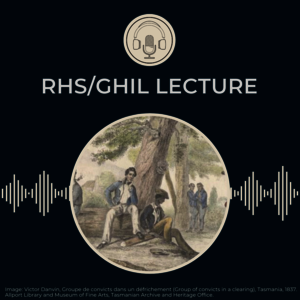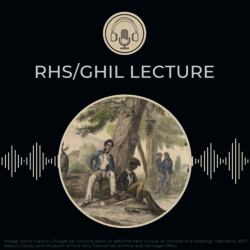 GHIL Podcast
GHIL Podcast

Special Lecture
Clare Anderson
Convicts, Creolization and Cosmopolitanism:
Aftermaths of penal transportation in the British Empire
Royal Historical Society Lecture
22 February 2024
(1:00 h)

Special Lecture
Clare Anderson
Convicts, Creolization and Cosmopolitanism:
Aftermaths of penal transportation in the British Empire
Special Lecture, given 23 January 2024
Between the late eighteenth and mid-twentieth centuries, the British transported over a quarter of a million convicts to colonies and settlements including in Australia, the Andaman Islands, Indian Ocean, and Southeast Asia. About one percent of the approximately 167,000 convicts shipped to the Australian colonies (1787-1868) were of Asian, African or Creole heritage; convicted either in Britain or British colonies. Most of the c. 108,000 convicts sent to penal settlements in Penang, Mauritius, Singapore, Malacca, Burma, and the Andamans (1789-1945) were from British India or Ceylon.
This paper will explore some of the histories and aftermaths of these convict flows, including their relationship to experiences and legacies of enslavement and other forms of imperial labour, and to Indigenous dispossession. It will draw on research in archives and with descendants and communities in Australia, Mauritius, Penang, and the Andamans to show how over time penal transportation broke and remade families, and to think through the ways in which economic, social, and cultural factors relating to race, ethnicity, religion and (for Hindus) caste, social background, education, and status intersected in the formation of convict and convict-descended societies. It will suggest that through genealogical research in recent years these societies have become connected to sending (and origin) locations and to sites of onward migration in Britain and the settler world. In some cases, descendants of ‘colonial’ descent are together creating new histories and forms of kinship to make sense of complex and sometimes elusive pasts.
Clare Anderson is a Professor of History at the University of Leicester, where she is dean for research excellence (interim) and director of the Leicester Institute of Advanced Studies (LIAS). Clare is a scholar of the history of empires and global history and focuses on the history and legacies of colonial prisons, penal colonies, and forced migration and labour. She has given public and keynote lectures in many countries and has been a visiting fellow at UT Sydney and the University of Tasmania. Clare has held both the Caird Research Fellowship and Sackler-Caird Senior Research Fellowship at the National Maritime Museum. She is a fellow of the Royal Historical Society, Higher Education Academy, and British Academy.